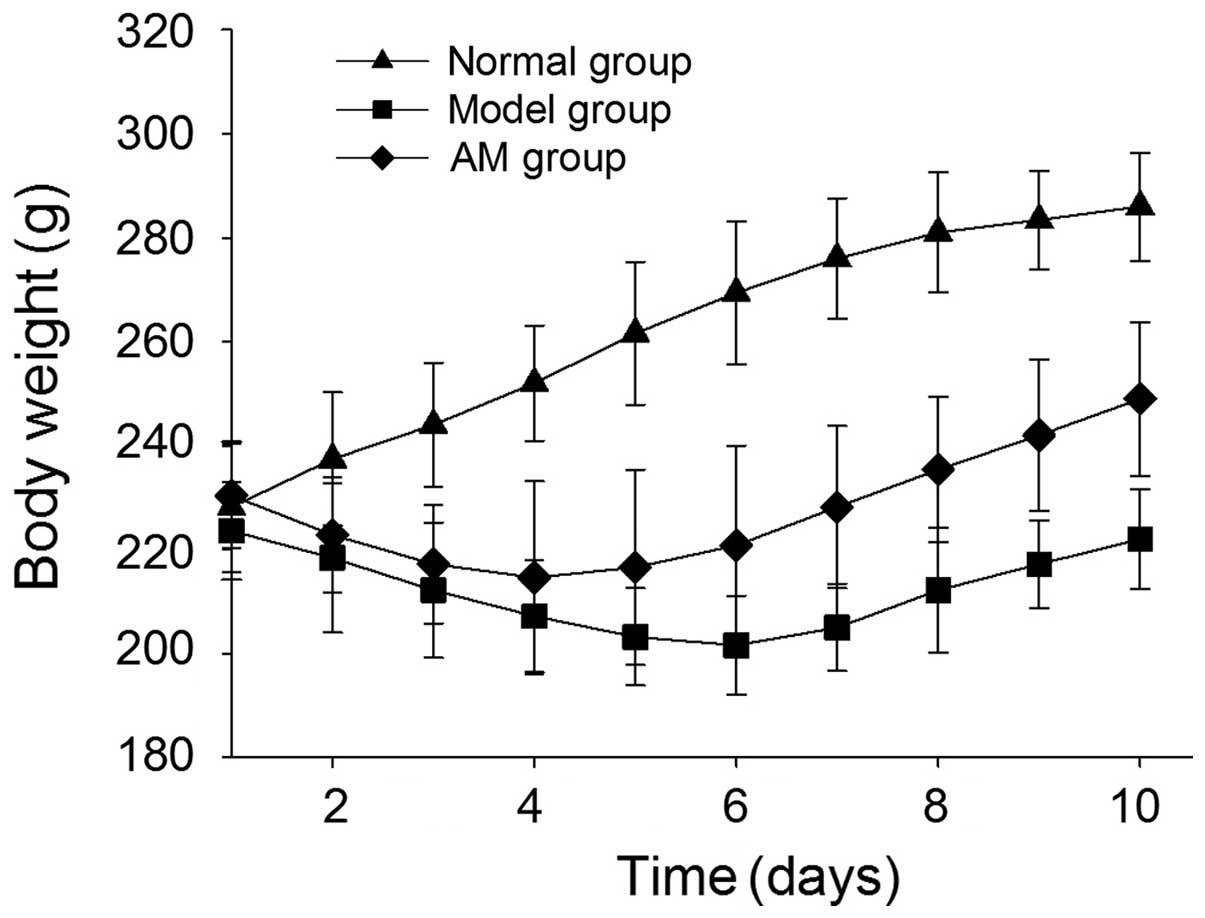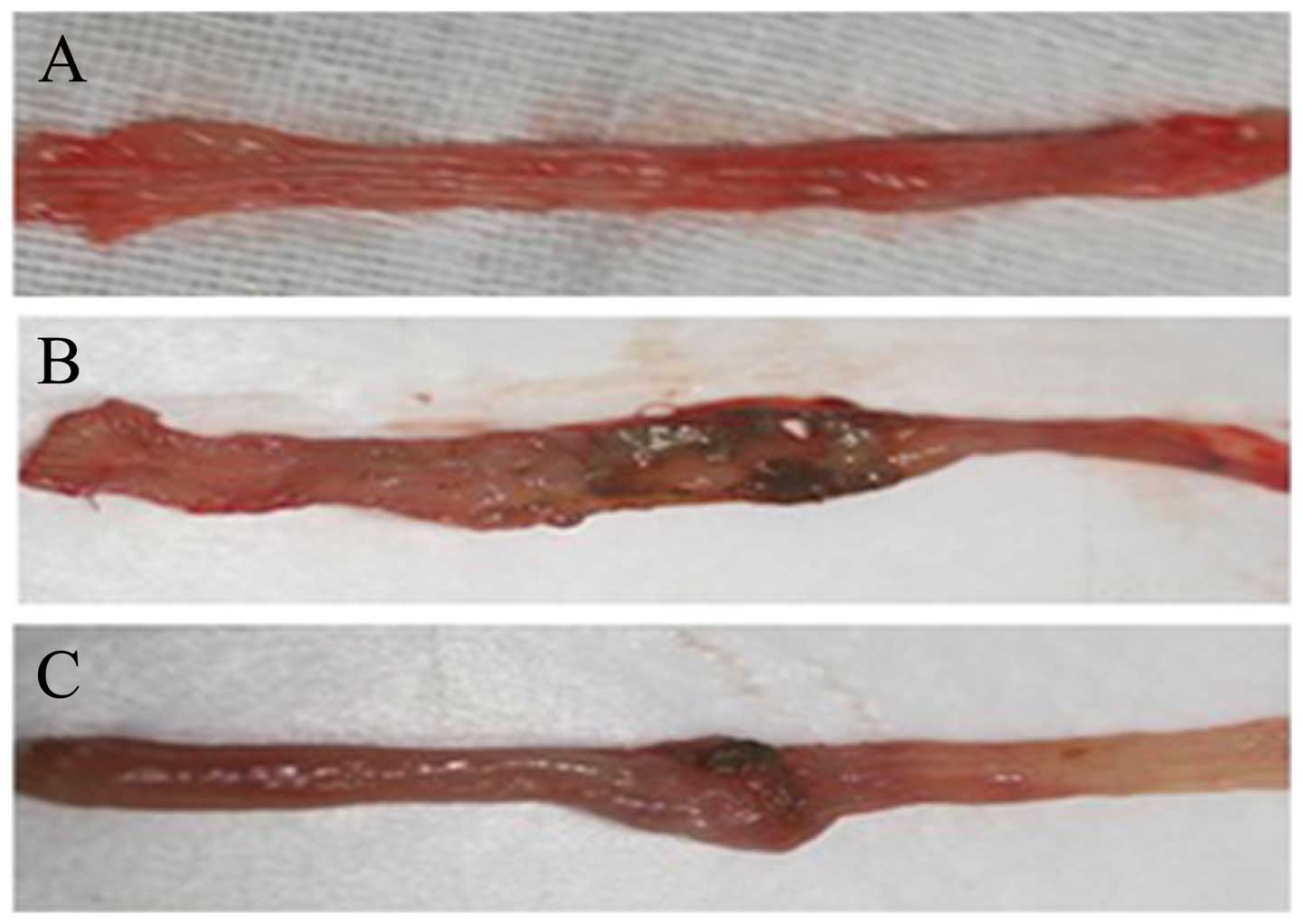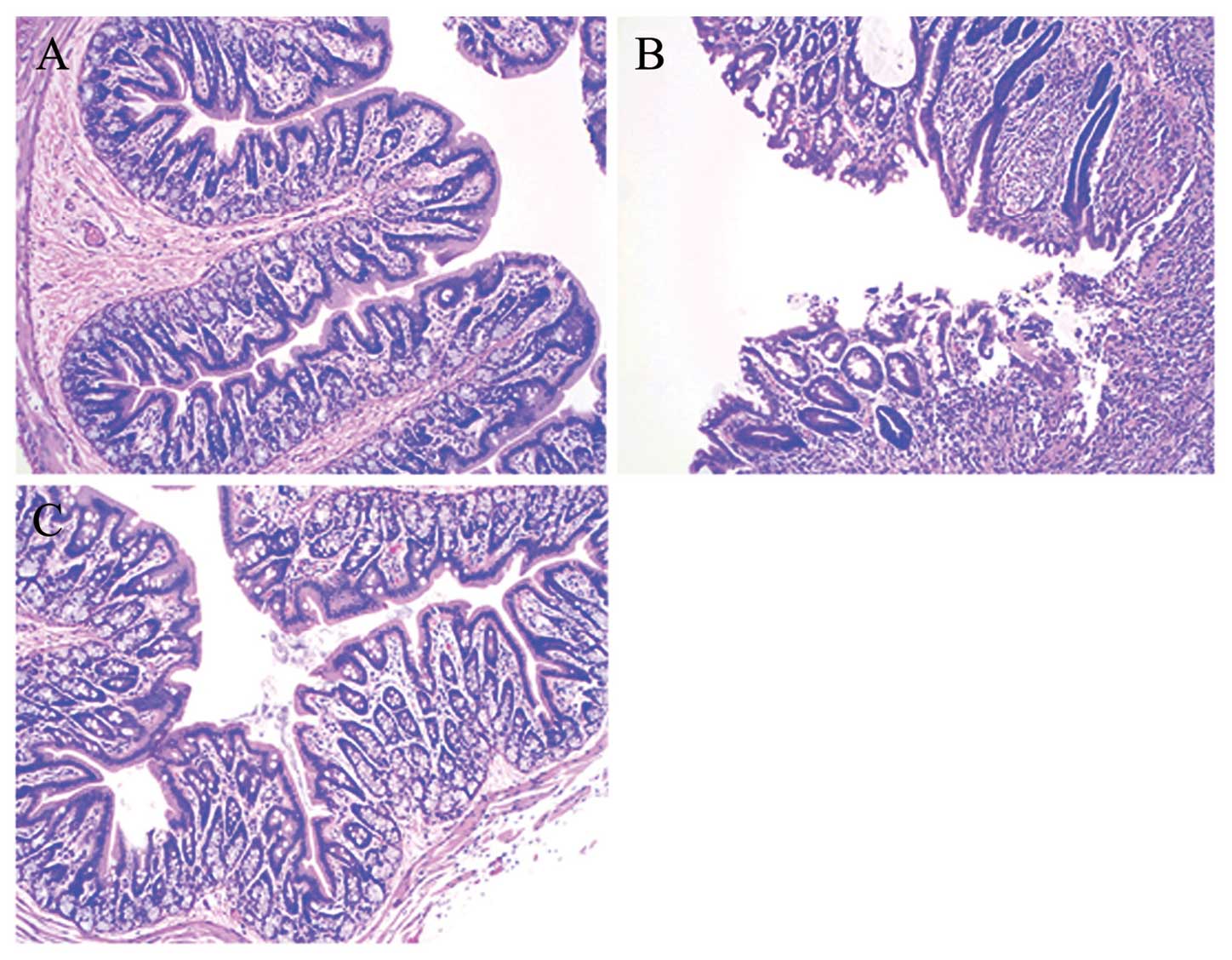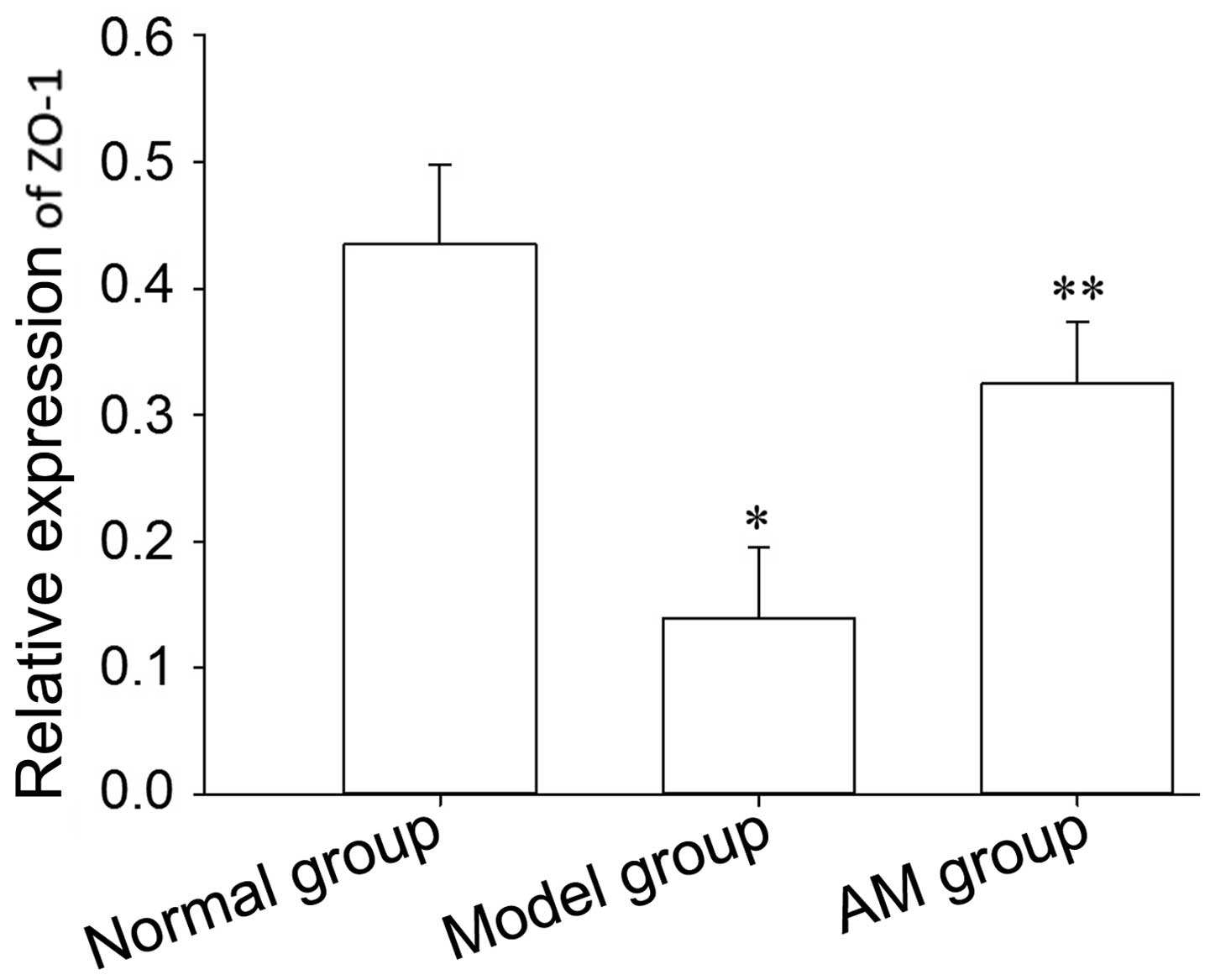|
1
|
Turner JR: Intestinal mucosal barrier
function in health and disease. Nat Rev Immunol. 9:799–809. 2009.
View Article : Google Scholar : PubMed/NCBI
|
|
2
|
Marchiando AM, Graham WV and Turner JR:
Epithelial barriers in homeostasis and disease. Annu Rev Pathol.
5:119–144. 2010. View Article : Google Scholar : PubMed/NCBI
|
|
3
|
Munkholm P, Langholz E, Hollander D,
Thornberg K, Orholm M, Katz KD and Binder V: Intestinal
permeability in patients with Crohn's disease and ulcerative
colitis and their first degree relatives. Gut. 35:68–72. 1994.
View Article : Google Scholar : PubMed/NCBI
|
|
4
|
Ashizuka S, Inagaki-Ohara K, Kuwasako K,
Kato J, Inatsu H and Kitamura K: Adrenomedullin treatment reduces
intestinal inflammation and maintains epithelial barrier function
in mice administered dextran sulphate sodium. Microbiol Immunol.
53:573–581. 2009. View Article : Google Scholar : PubMed/NCBI
|
|
5
|
Gardiner KR, Anderson NH, Rowlands BJ and
Barbul A: Colitis and colonic mucosal barrier dysfunction. Gut.
37:530–535. 1995. View Article : Google Scholar : PubMed/NCBI
|
|
6
|
Clayburgh DR, Shen L and Turner JR: A
porous defense: The leaky epithelial barrier in intestinal disease.
Lab Invest. 84:282–291. 2004. View Article : Google Scholar : PubMed/NCBI
|
|
7
|
Gibson PR: Increased gut permeability in
Crohn's disease: Is TNF the link? Gut. 53:1724–1725. 2004.
View Article : Google Scholar : PubMed/NCBI
|
|
8
|
Nusrat A, Turner JR and Madara JL:
Molecular physiology and pathophysiology of tight junctions. IV
Regulation of tight junctions by extracellular stimuli: Nutrients,
cytokines, and immune cells. Am J Physiol Gastrointest Liver
Physiol. 279:G851–G857. 2000.PubMed/NCBI
|
|
9
|
Ye D, Ma I and Ma TY: Molecular mechanism
of tumor necrosis factor-alpha modulation of intestinal epithelial
tight junction barrier. Am J Physiol Gastrointest Liver Physiol.
290:G496–G504. 2006. View Article : Google Scholar : PubMed/NCBI
|
|
10
|
Gu L, Li N, Gong J, Li Q, Zhu W and Li J:
Berberine ameliorates intestinal epithelial tight-junction damage
and down-regulates myosin light chain kinase pathways in a mouse
model of endotoxinemia. J Infect Dis. 203:1602–1612. 2011.
View Article : Google Scholar : PubMed/NCBI
|
|
11
|
Costantini TW, Loomis WH, Putnam JG, et
al: Pentoxifylline modulates intestinal tight junction signaling
after burn injury: Effects on myosin light chain kinase. J Trauma.
66:17–24; discussion 24–25. 2009. View Article : Google Scholar : PubMed/NCBI
|
|
12
|
Shen L: Tight junctions on the move:
Molecular mechanisms for epithelial barrier regulation. Ann NY Acad
Sci. 1258:9–18. 2012. View Article : Google Scholar : PubMed/NCBI
|
|
13
|
Liu X, Xu J, Mei Q, Han L and Huang J:
Myosin light chain kinase inhibitor inhibits dextran sulfate
sodium-induced colitis in mice. Dig Dis Sci. 58:107–114. 2013.
View Article : Google Scholar
|
|
14
|
Elsasser TH and Kahl S: Adrenomedullin has
multiple roles in disease stress: Development and remission of the
inflammatory response. Microsc Res Tech. 57:120–129. 2002.
View Article : Google Scholar : PubMed/NCBI
|
|
15
|
Sakata J, Asada Y, Shimokubo T, Kitani M,
Inatsu H, Kitamura K, Kangawa K, Matsuo H, Sumiyoshi A and Eto T:
Adrenomedullin in the gastrointestinal tract. Distribution and gene
expression in rat and augmented gastric adrenomedullin after
fasting. J Gastroenterol. 33:828–834. 1998. View Article : Google Scholar : PubMed/NCBI
|
|
16
|
Ashizuka S, Ishikawa N, Kato J, Yamaga J,
Inatsu H, Eto T and Kitamura K: Effect of adrenomedullin
administration on acetic acid-induced colitis in rats. Peptides.
26:2610–2615. 2005. View Article : Google Scholar : PubMed/NCBI
|
|
17
|
Kataoka Y, Miyazaki S, Yasuda S, Nagaya N,
Noguchi T, Yamada N, Morii I, Kawamura A, Doi K, Miyatake K, et al:
The first clinical pilot study of intravenous adrenomedullin
administration in patients with acute myocardial infarction. J
Cardiovasc Pharmacol. 56:413–419. 2010. View Article : Google Scholar : PubMed/NCBI
|
|
18
|
Gonzalez-Rey E, Fernandez-Martin A, Chorny
A and Delgado M: Therapeutic effect of urocortin and adrenomedullin
in a murine model of Crohn's disease. Gut. 55:824–832. 2006.
View Article : Google Scholar : PubMed/NCBI
|
|
19
|
Talero E, Alvarez de Sotomayor M,
Sánchez-Fidalgo S and Motilva V: Vascular contribution of
adrenomedullin to microcirculatory improvement in experimental
colitis. Eur J Pharmacol. 670:601–607. 2011. View Article : Google Scholar : PubMed/NCBI
|
|
20
|
Hayashi Y, Narumi K, Tsuji S, Tsubokawa T,
Nakaya MA, Wakayama T, Zuka M, Ohshima T, Yamagishi M and Okada T:
Impact of adrenomedullin on dextran sulfate sodium-induced
inflammatory colitis in mice: Insights from in vitro and in vivo
experimental studies. Int J Colorectal Dis. 26:1453–1462. 2011.
View Article : Google Scholar : PubMed/NCBI
|
|
21
|
Carrizo GJ, Wu R, Cui X, Dwivedi AJ, Simms
HH and Wang P: Adrenomedullin and adrenomedullin-binding protein-1
down-regulate inflammatory cytokines and attenuate tissue injury
after gut ischemia-reperfusion. Surgery. 141:245–253. 2007.
View Article : Google Scholar : PubMed/NCBI
|
|
22
|
Zuo D, Liu X, Shou Z, Fan H, Tang Q, Duan
X, Cao D, Zou Z and Zhang L: Study on the interactions between
transplanted bone marrow-derived mesenchymal stem cells and
regulatory T cells for the treatment of experimental colitis. Int J
Mol Med. 32:1337–1344. 2013.PubMed/NCBI
|
|
23
|
Li X, Wang Q, Xu H, Tao L, Lu J, Cai L and
Wang C: Somatostatin regulates tight junction proteins expression
in colitis mice. Int J Clin Exp Pathol. 7:2153–2162.
2014.PubMed/NCBI
|
|
24
|
Greig E and Sandle GI: Diarrhea in
ulcerative colitis. The role of altered colonic sodium transport.
Ann NY Acad Sci. 915:327–332. 2000. View Article : Google Scholar
|
|
25
|
Schmitz H, Barmeyer C, Fromm M, Runkel N,
Foss HD, Bentzel CJ, Riecken EO and Schulzke JD: Altered tight
junction structure contributes to the impaired epithelial barrier
function in ulcerative colitis. Gastroenterology. 116:301–309.
1999. View Article : Google Scholar : PubMed/NCBI
|
|
26
|
Fischer A, Gluth M, Pape UF, Wiedenmann B,
Theuring F and Baumgart DC: Adalimumab prevents barrier dysfunction
and antagonizes distinct effects of TNF-α on tight junction
proteins and signaling pathways in intestinal epithelial cells. Am
J Physiol Gastrointest Liver Physiol. 304:G970–G979. 2013.
View Article : Google Scholar : PubMed/NCBI
|
|
27
|
Ma TY, Boivin MA, Ye D, Pedram A and Said
HM: Mechanism of TNF-{alpha} modulation of Caco-2 intestinal
epithelial tight junction barrier: Role of myosin light-chain
kinase protein expression. Am J Physiol Gastrointest Liver Physiol.
288:G422–G430. 2005. View Article : Google Scholar : PubMed/NCBI
|
|
28
|
Marchiando AM, Shen L, Graham WV, Weber
CR, Schwarz BT, Austin JR 2nd, Raleigh DR, Guan Y, Watson AJ,
Montrose MH, et al: Caveolin-1-dependent occludin endocytosis is
required for TNF-induced tight junction regulation in vivo. J Cell
Biol. 189:111–126. 2010. View Article : Google Scholar : PubMed/NCBI
|
|
29
|
Sommer J, Engelowski E, Baran P, Garbers
C, Floss DM and Scheller J: Interleukin-6, but not the
interleukin-6 receptor plays a role in recovery from dextran sodium
sulfate-induced colitis. Int J Mol Med. 34:651–660. 2014.PubMed/NCBI
|
|
30
|
Irvine EJ and Marshall JK: Increased
intestinal permeability precedes the onset of Crohn's disease in a
subject with familial risk. Gastroenterology. 119:1740–1744. 2000.
View Article : Google Scholar : PubMed/NCBI
|
|
31
|
Wyatt J, Vogelsang H, Hübl W, Waldhöer T
and Lochs H: Intestinal permeability and the prediction of relapse
in Crohn's disease. Lancet. 341:1437–1439. 1993. View Article : Google Scholar : PubMed/NCBI
|
|
32
|
Wang F, Graham WV, Wang Y, Witkowski ED,
Schwarz BT and Turner JR: Interferon-gamma and tumor necrosis
factor-alpha synergize to induce intestinal epithelial barrier
dysfunction by up-regulating myosin light chain kinase expression.
Am J Pathol. 166:409–419. 2005. View Article : Google Scholar : PubMed/NCBI
|
|
33
|
Taylor CT, Dzus AL and Colgan SP:
Autocrine regulation of epithelial permeability by hypoxia: Role
for polarized release of tumor necrosis factor alpha.
Gastroenterology. 114:657–668. 1998. View Article : Google Scholar : PubMed/NCBI
|
|
34
|
Ueda S, Nishio K, Minamino N, Kubo A, Akai
Y, Kangawa K, Matsuo H, Fujimura Y, Yoshioka A, Masui K, et al:
Increased plasma levels of adrenomedullin in patients with systemic
inflammatory response syndrome. Am J Respir Crit Care Med.
160:132–136. 1999. View Article : Google Scholar : PubMed/NCBI
|
|
35
|
Higuchi S, Wu R, Zhou M, Marini CP,
Ravikumar TS and Wang P: Gut hyperpermeability after ischemia and
reperfusion: Attenuation with adrenomedullin and its binding
protein treatment. Int J Clin Exp Pathol. 1:409–418.
2008.PubMed/NCBI
|





















